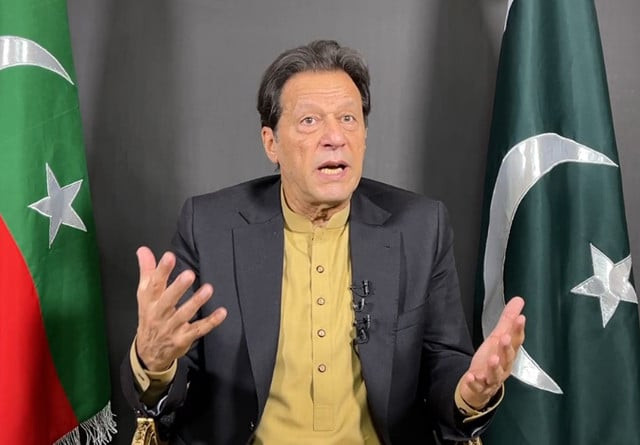Bajwa did to Pakistan no enemy could, says Imran
PTI chief says will unveil date for dissolving assemblies on Dec 17

Lamenting once again fettered rule and control during his time in PM’s office, Imran said that General (retd) Qamar Javed Bajwa “did to Pakistan what no enemy could do to the country”, adding that the former army chief gave NRO II to the then opposition.
"Gen (retd) Bajwa asked me to grant NRO II to the then opposition when the government had to pass laws related to the Financial Action Task Force. It was Gen (retd) Bajwa who gave NRO II to the then opposition," the PTI chief said in his address to the nation via video link.
Imran said the way his party was treated in the past seven months was “unprecedented”.
“[Our allies] were receiving calls from unknown numbers and were asked to stop supporting Imran Khan,” he said.
“What happened with Arshad Sharif, Azam Swati, Shahbaz Gul and Jameel Farooqui happened only because they were giving statements in our favour,” he added.
The PTI chairman said he did not witness the kind of violation of human rights during the rule of former dictator General Musharraf that happened this time.
“No enemy could do what General (retd) Bajwa did to Pakistan.”
Imran dispelled the impression that he was seeking the establishment’s help to return to power and hoped that the establishment would remain “neutral”.
“I want the establishment to be neutral so its honour increases,” he pressed and noted that the distance between the establishment and the public had widened over the last few years.
He reiterated that a strong army was in the country’s best interest and he did not want the institution to weaken. He pointed out that criticising some “black sheep” in the institution was “not the same as criticising the army”.
He stressed that it was important for all the stakeholders, including the establishment and judiciary, to realise that Pakistan’s economy was standing at a crucial point today.
“I want to say this to all the institutions today […] what is happening today will affect all of you […] the entire country will go down and if that happens, national security will be impacted the most.”
He further said that if a country defaults, then national security was the first area to get affected, adding that “everybody knows what will those who help the country bailout demand if Pakistan defaults”.
Moreover, Imran also condemned the treatment PTI party leaders Azam Swati and Shahbaz Gill were subjected to and claimed that “attempts have been made to weaken Pakistan’s biggest national party”.
Date for dissolution of assemblies
Imran said he would announce the date for the dissolution of Khyber-Pakhtunkhwa and Punjab assemblies on December 17 to trigger polls in over "70 per cent of Pakistan within 90 days in line with the law".
He dialled up his resolve to have the assemblies dissolved, a date for which would be revealed at the party's public gathering at Lahore's iconic Liberty Chowk.
Following the dissolution of assemblies, the party will hold elections in the provinces, the former prime minister added.
Imran’s statement came a day after he held a meeting of PTI’s Central Punjab and Lahore leadership during which party lawmakers expressed their full support for the party chairman’s decision. The former premier had announced his decision to scuttle elected houses at the end of the ‘long march’ in Rawalpindi last month, in a bid to compel the PML-N-led coalition to hold snap polls.
“The law says that as soon as assemblies are dissolved, elections should be held within 90 days," he said during his address.
“Ideally, if elections are held in 70 per cent of the country then they might just hold general elections. But it is unfortunate that criminals are sitting [in the government] and they don’t care about the country and when bad times take over the country, they will exit the country," the PTI chairman regretted.
Criticising the government for creating hurdles, Imran attributed coalition rulers’ reluctance to step down to their anxiety about their corruption cases. “They are worried that if a new government takes over, their corruption cases would be reopened.”
NA resignations
Imran also announced that all PTI National Assembly members — whose resignations have not been accepted — will ask the speaker inside the assembly to accept their resignations.
PTI leader Qasim Suri, in his capacity as the acting speaker on April 13, had accepted the resignations of 123 PTI MNAs, who had abided by their party chairman Imran Khan’s appeal after his removal from the office of the prime minister through a no-confidence motion earlier in the month.
However, on April 17, newly elected NA Speaker Ashraf had directed the assembly secretariat to deal with the resignations of the PTI lawmakers afresh and present them before him so that they could be treated as per law.
Earlier this week, the NA speaker urged PTI lawmakers to return to parliament, saying he would not accept any of their resignations unless he was “satisfied” that they were not tendered under duress.
Attempts at disqualification
Imran once again trained his guns toward the chief election commissioner and his “one-point agenda” to get him disqualified – an example of which, Imran said, was the Toshakhana and foreign funding case.
“The day the Toshakhana case goes to court […] I can say in writing that everything I did was legal,” he said. “Whenever the investigation is completed, it’ll be clear that the PTI is the only party in the country that did political fundraising in a proper manner.”
He recalled that his party had approached the courts several times with the plea that funding cases of all political parties should be heard together. However, he regretted that it was not happening “because when the cases open every one will find out how they raise funds”.



















COMMENTS
Comments are moderated and generally will be posted if they are on-topic and not abusive.
For more information, please see our Comments FAQ